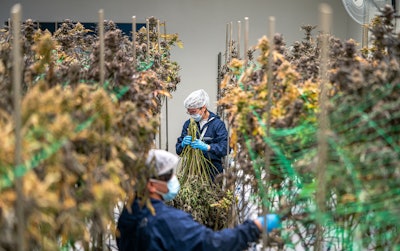
The diverse challenges and innovations that continue to shape the cannabis industry have made the evolving partnerships among licensed operators, higher-ed institutions, and regulators increasingly important for running a business.
As legalization progresses, the need for a skilled and knowledgeable cannabis workforce has never been higher. Workforce and business development training programs are now essential for staffing cultivation, processing, and retail operations with employees who can help ensure business success and compliance.
Through establishing public-private partnerships (PPPs) with government and education programs, cannabis businesses can build workforce pipelines that continue to support their operations. These PPPs can influence hiring, compliance readiness, and long-term sustainability.
Here are a few examples:
- The Maryland Cannabis Administration’s Workforce Development Program includes 100-plus hours of training for retail, processing and cultivation careers and is supported by the state’s regulatory agency with private-sector instructors.
- The Massachusetts Cannabis Control Commission’s Social Equity Program continues to expand to include training and technical support in collaboration with local organizations to provide sustainable pathways into the industry for those most impacted by the drug war.
- The City University of New York’s (CUNY) Cannabis Workforce and Business Development Program offers security solutions, retail management, and manufacturing technician programs to prepare individuals for licensed jobs in the industry. CUNY also offers a nine-week online certification program that provides individuals with a comprehensive understanding of the industry and best practices for cultivation.
Building a Qualified Labor Pool
One of the biggest values of these training programs is how they build a pool of job candidates who already understand the demands of cannabis businesses. Whether it’s knowledge of plant science, compliance, or customer service, operators who hire people with specialized education make their operations smoother and reduce mistakes. In fact, several business owners have shared that it improves day-to-day efficiency.
Aligning Curriculum With Industry Realities
One notable trend in cannabis workforce training is the way colleges, regulators, and industry leaders are collaborating to develop educational programs that are truly relevant. These programs rapidly adapt to provide practical business skills, regulatory knowledge, and hands-on experience that reflect the real needs of today’s cannabis businesses. By drawing on input from operators and policymakers, these educational paths are staying current with compliance requirements, workplace safety, and industry-best practices.
Having previously interviewed multiple educators and administrators who are shaping the future of cannabis in higher education, I have seen firsthand how dynamic and tailored these programs are becoming.
For example, Rob Mejia, an adjunct professor of cannabis studies at Stockton University in New Jersey, told me, “Our students get jobs in the cannabis and hemp fields.”
Meanwhile, David Paleschuck, author and professor, emphasized the need for business acumen: “When working in cannabis, having core business skills is essential,” he said. “Understanding and adhering to laws and regulations are paramount.”
What stood out most in my discussions is that these programs are not one-size-fits-all, as Jennifer Maden, assistant dean and director of graduate studies at Rowan University, pointed out. Located in New Jersey, Rowan University’s Center for Cannabis Workforce Development offers a curriculum and extracurricular programs that allow students to gain the experience needed to enter the state’s cannabis and cannabis-related industries. The university’s cannabis education program includes cannabinoid chemistry, cannabis commercialization, and legal studies, in addition to a cannabis apprenticeship training program for career growth in cannabis retail.
“One size does not fit all,” Maden said. “Cross-over talent is in high demand, so identify your best skills and talents where you can bring expertise into cannabis and then focus your cannabis studies in areas where your knowledge is limited.”
Students in these programs represent a mix of backgrounds, from career changers and industry newcomers to first-generation college students, each bringing different perspectives and goals. This diversity enriches classroom discussions and helps drive innovation, but it also means educators must continue to update curriculum to keep up with changing industry standards and expectations.
Community colleges and universities are increasingly collaborating with state agencies to make sure their courses reflect both local regulations and the realities of the cannabis job market. Because of this, recent graduates from these programs aren’t just technically trained; they have an understanding of compliance and ethics, which business owners view as a major asset on the job
Actionable Insights for Licensed Cultivators and Dispensaries
 Pexels | RDNE Stock project
Pexels | RDNE Stock project
- Offer internship opportunities in partnership with local colleges or training providers to give students hands-on experience while building a pipeline of talent for your operation.
- Consider offering feedback or participating in curriculum advisory boards to help align workforce programs with your sector's specific needs and evolving standards.
- Volunteer as a guest speaker or lecturer at local colleges to share real-world business insights and encourage students to pursue careers in cannabis, one of the fastest-growing industries.
By proactively engaging with workforce development initiatives, licensed operators can future-proof their businesses, reduce risk, and maintain a competitive edge as the market and regulations evolve.
Takeaways for Business and Policy Leaders
- Workforce development programs are key to building a sustainable and professional cannabis labor market.
- Collaboration among educators, regulators, and businesses is what keeps training programs relevant and effective.
- Licensed cannabis businesses benefit from hiring employees who are already trained in compliance, safety, and operational best practices, reducing risk and improving performance.
- Academic and training institutions play an important role in the industry’s future by actively responding to evolving business needs and shifting regulatory landscapes.
 Pexels | Diego Barros
Pexels | Diego Barros
As the cannabis industry matures, the integration of targeted workforce and business development training will be essential in maintaining high standards, supporting business growth, and fostering a compliant and professional workforce.



























